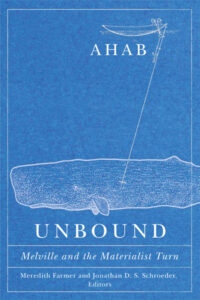New collection of essays on Captain Ahab coedited by Professor Meredith Farmer

Assistant Teaching Professor Meredith Farmer has coedited a collection of essays on Melville’s Captain Ahab along with Jonathan D. S. Schroeder (Brandeis University). The collection is titled Ahab Unbound: Melville and the Materialist Turn and is published by University of Minnesota Press.
About Ahab Unbound (From the Publisher):
Herman Melville’s Captain Ahab is perennially seen as the paradigm of a controlling, tyrannical agent. Ahab Unbound leaves his position as a Cold War icon behind, recasting him as a contingent figure, transformed by his environment—by chemistry, electromagnetism, entomology, meteorology, diet, illness, pain, trauma, and neurons firing—in ways that unexpectedly force us to see him as worthy of our empathy and our compassion.
In sixteen essays by leading scholars, Ahab Unbound advances an urgent inquiry into Melville’s emergence as a center of gravity for materialist work, reframing his infamous whaling captain in terms of pressing conversations in animal studies, critical race and ethnic studies, disability studies, environmental humanities, medical humanities, political theory, and posthumanism. By taking Ahab as a focal point, we gather and give shape to the multitude of ways that materialism produces criticism in our current moment. Collectively, these readings challenge our thinking about the boundaries of both persons and nations, along with the racist and environmental violence caused by categories like the person and the human.
Ahab Unbound makes a compelling case for both the vitality of materialist inquiry and the continued resonance of Melville’s work.
About the Editors (From the Publisher):
Meredith Farmer is assistant teaching professor in English and the Environmental Program at Wake Forest University. She is author of the forthcoming book Melville’s Leaks: Science, Materialism, and the Reconstitution of Persons.
Jonathan D. S. Schroeder is visiting assistant professor of American studies at Brandeis University.
Categories: Faculty News
